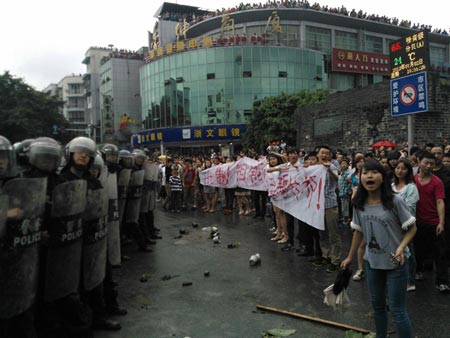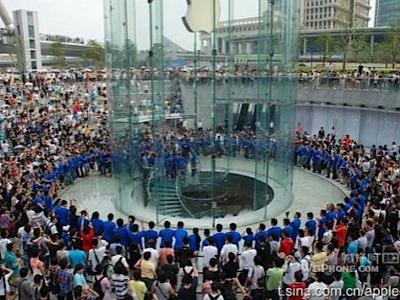The only thing in politics that could really slow climate change
24 Jul
No, it is not the EU emission trading system, or more of costly wind farm subsidies in troubled Europe. It is not a strict global climate deal, which has a close to zero chance. It is Chinese public anger and protests –not against CO2 emissions, but against local pollution, later on potentially against the whole political system.
And protests against pollution in China are on the rise, as we just saw in Sichuan, where thousands clashed with riot police. The success of this and other recent environmental protests may urge others to follow suit, giving a hard time to Chinese leaders, but –as a by-product– giving the world a hope to slow climate change as well.

Clashes in Shifang (Sichuan province), source: libcom
However tough the EU’s struggles for lower CO2 emissions seem, they are far from enough to make any difference on a global scale. To use the vivid example coined by Fatih Birol, IEA’s chief economist: the fuss over whether to cut 20 or 30% in the EU emissions annually by 2020 is equal to 2 or 3 weeks of Chinese emissions. Without something happening in emerging countries, especially China, we will have to start thinking about adapting to changing climates and forget about averting it. This is not meant as an excuse: Europe may still have a real environmental impact through setting examples and standards, rather than by the actual size of its emission reductions.
Still, a strict global agreement now seems more distant than ever, as developed countries are in a deep debt crisis and in a very slow growth phase, and these will not go away any time soon. Doing something to boost growth and employment seems to be overwhelming the climate goals.
And China will not solve the issue because it is altruistic or sympathetic with the world. It rightfully argues that it has the right to become richer, which is associated with higher energy demand (and usually also more emissions) – after all emissions on a per capita basis are way lower in China than in the OECD.
But local pollution is also a serious issue in China: examples are many, just to give a relatively recent striking one, the Economist reported the extremely high and dangerous levels of PM2.5 (very fine particulate matter) in most of China, killing many each year.
And people are starting to protest against local pollution. Take a recent example in Sichuan province: soon after the plans of building a copper factory were announced, thousands of locals protested and clashed with police. They also reached their goal: the plans were canceled (at least there, probably the factory would be built elsewhere).
This demonstration is part of a more general tendency. Last year saw one of the largest demonstrations since Tiananmen Square, in north-east Dalian, against a damaged chemical factory. The Dalian demonstrations were peaceful, yet they also reached the goal of shutting down the factory. The success and the coverage of these events in blogs and social media suggest there is more to come.
The driver underlying the trend is economic growth itself. As people in China get richer, they also care more about their local livelihood. And this ongoing ‘middle-classization’ means that people will increasingly raise their voices, in many issues. There are thousands of protests in China each year, most of these are over local issues: it is easier (and also more tolerated) to demonstrate against something local, and there is a higher chance that the leadership changes its mind. (As an –admittedly distant– Hungarian parallel, the demonstrations against the Bős-Nagymaros hydro plant right before the 89-90 transition drew in more protesters than general purpose demonstrations and in retrospect seem an important milestone in the transition.)

Middle-classization: Apple store opening in Shanghai, source: maclife
The rise of the middle class sows the seeds of the need of more representation and growing clashes along the way. Either the preferences of the population will be better represented, and pollution declines because of that. Or the whole issue of representation is not resolved in a gradual, peaceful way, but then pollution declines because of the likely chaos and economic slowdown/decline. Maybe these do not sound as fancy as politicians saving the day with a global climate deal, but in today’s political climate, it still has a far higher chance.
If you liked the post, follow Barrelperday on Facebook!
Or subscribe to our Twitter feed or Newsletter
Tags: China, climate change, CO2


No comments yet